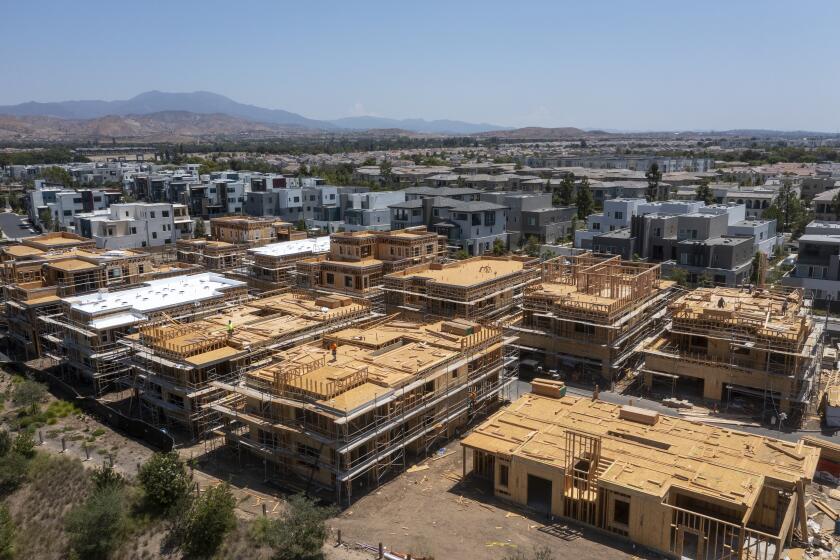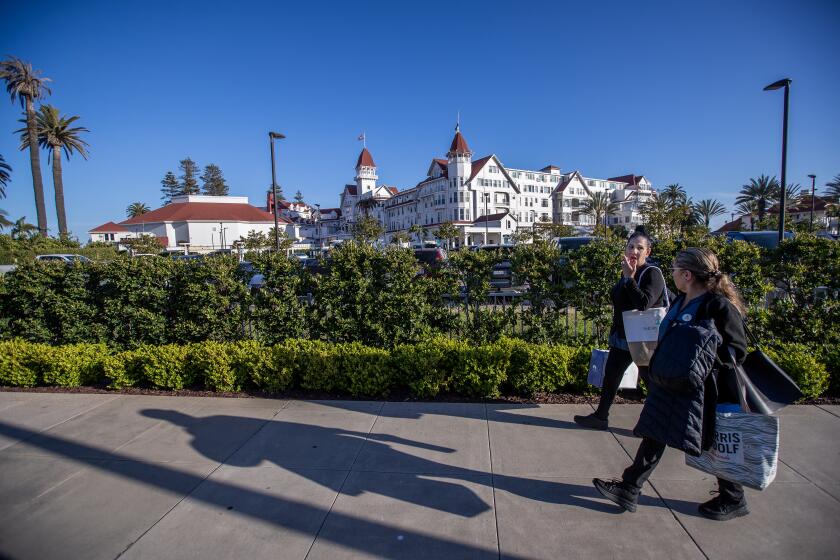A historic Black church’s new gospel in Oakland: Fight the high housing costs
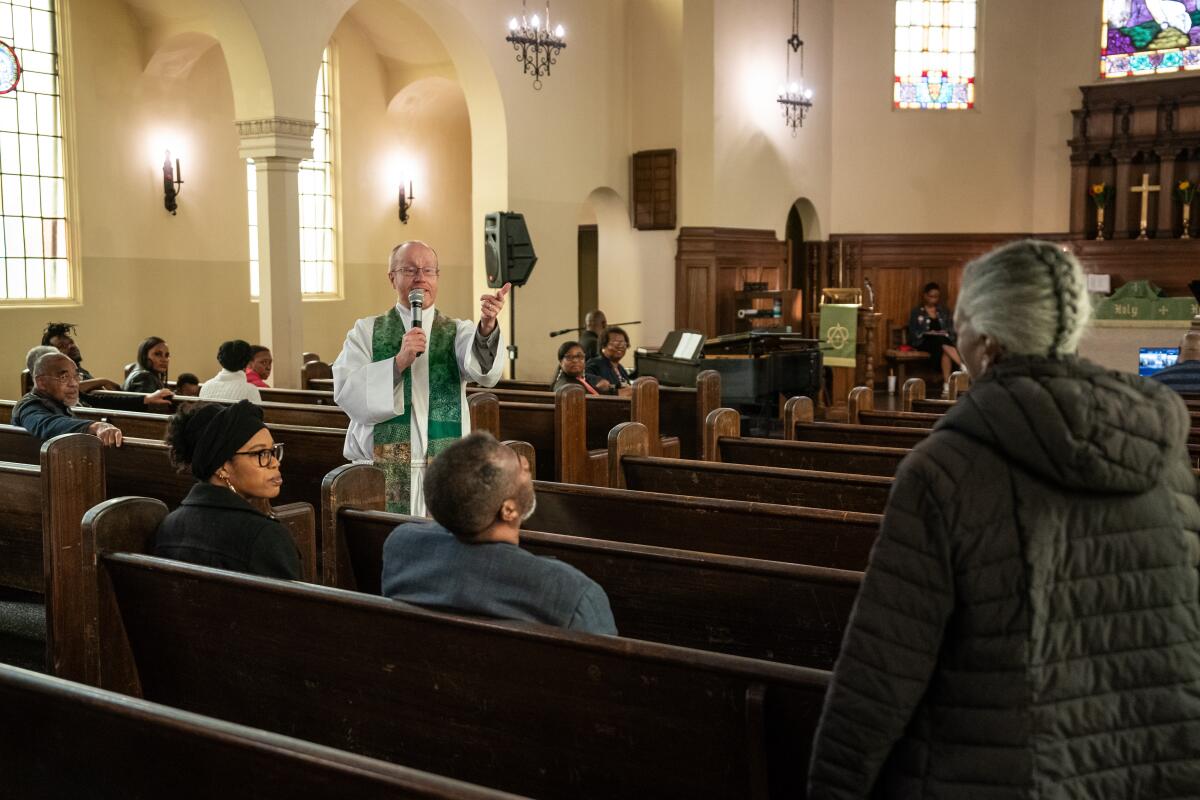
- Share via
Four decades ago, during the heyday of Bethlehem Lutheran Church in West Oakland, hundreds would show up for worship on Sundays. The grand sanctuary of the historic Black church, with its stained glass windows and elegant wooden pews, got so full, if you arrived five minutes late it was standing room only.
These days, as many Black residents have left amid the high cost of housing, the services are largely empty, save for a couple dozen faithful who return week after week, some of them from faraway suburbs.
So it was that on a Sunday this fall, Pastor Todd Benson stood at the altar in the golden light of the stained glass and — addressing about 20 men and women and a handful of kids — he turned his sermon from the gospel of Matthew to an existential struggle for the Black community in West Oakland and the future of the church itself: the housing crisis.
The average rent of an apartment in the city is now more than $2,700, he said, his voice rising. Housing costs are so high, adult children increasingly move far from their parents because they can’t afford a home where they were born, he added. A handful of the elders in the pews nodded in agreement.
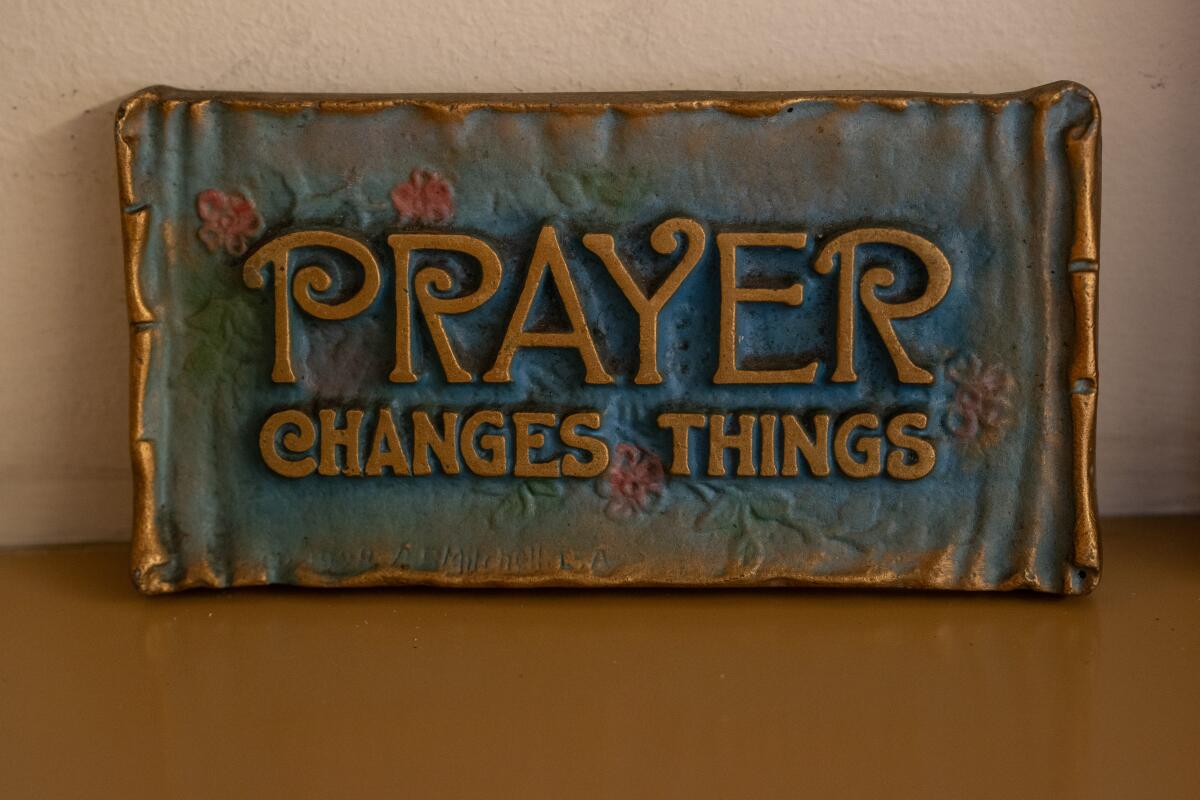
The old Victorians nearby, Benson noted, used to be owned by local residents. Now they’re often owned by unknown entities that rent them from afar. Only if people clearly understand the challenges facing the community can they help address them, he said.
“Jesus reminds us today, just like he did 2,000 years ago, that we can’t change anything until we truly see what it is,” he said. “We can make things better. We can and will experience the reality of resurrection today in our communities.”
California is losing population and adding housing units, but housing costs are still sky-high, and experts don’t expect that to change anytime soon.
The sermon at Bethlehem Lutheran is part of the congregation’s efforts this year to go beyond its walls and fight the high housing costs that have left so many here homeless or pushed others away. For members of the congregation, they are motivated also by their desire to save the church itself from being lost to the same forces that have swept away so many Black institutions in the community.
This year, working closely with Faith in Action East Bay — an organizing group that includes congregations across the East Bay and has long brought churches together to take on issues like housing and violence — the church hired door knockers to walk the streets of the neighborhood, interviewing residents about their housing needs. Street by street, door by door, they ask tenants about the cost of rent, the percentage of their income they pay toward rent and about whether tenants have faced any harassment from their landlords.
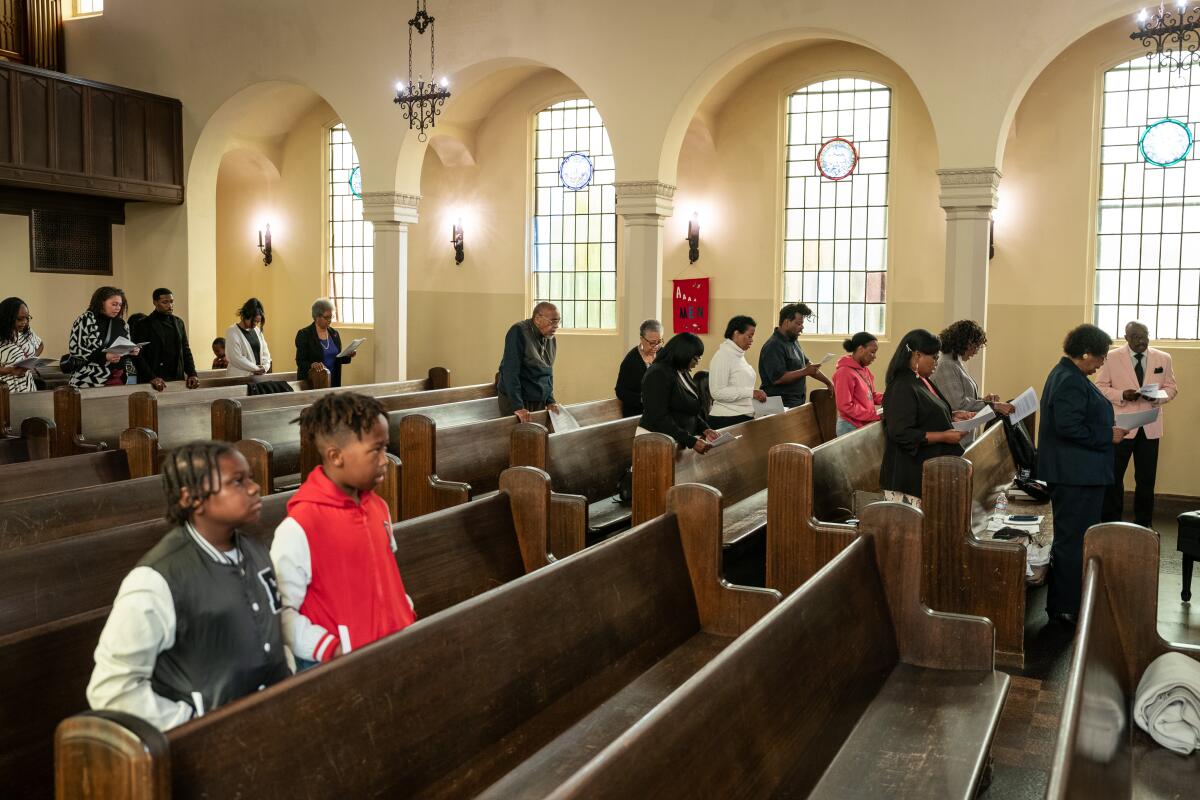
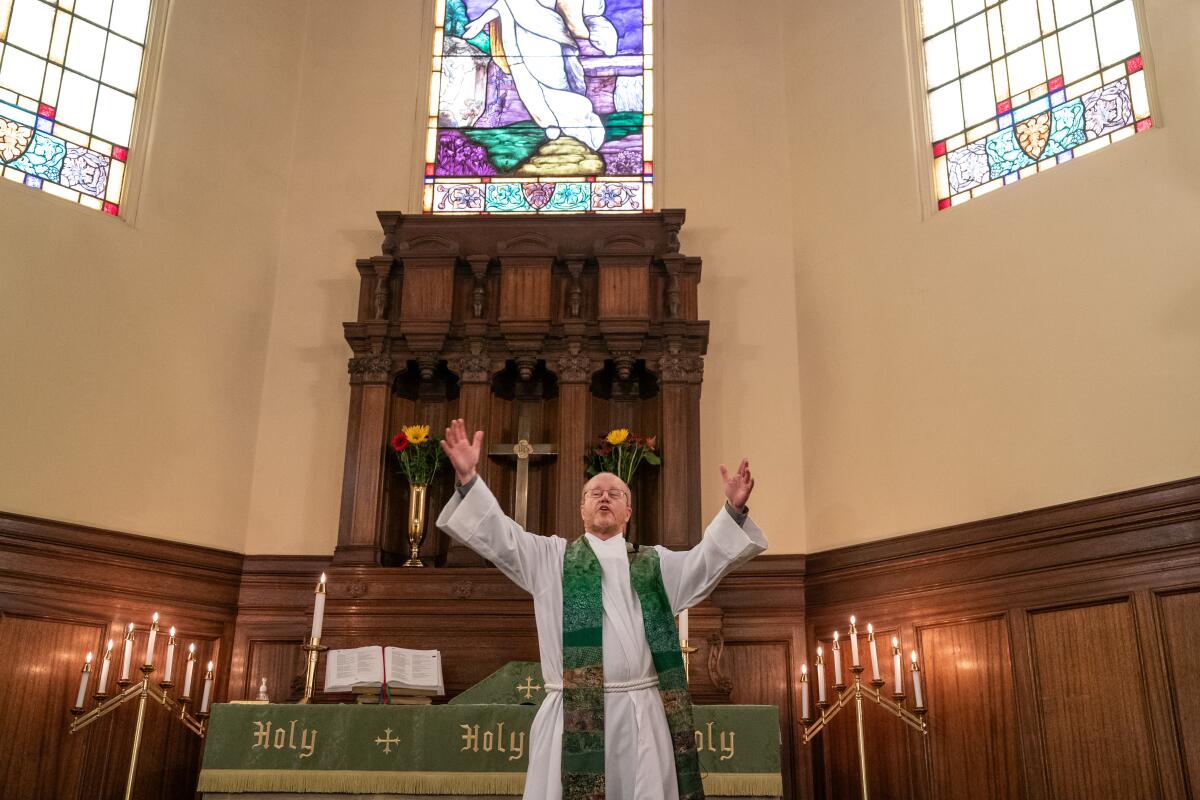
The effort is also part of a statewide push by the group PICO California to get churches involved in the housing crisis under the mantra “Home is Sacred,” in part by advocating to tighten renter protections and for the state to streamline the approval process to build affordable housing on land owned by religious institutions.
For Benson, who arrived at Bethlehem Lutheran two years ago as a white outsider from Union City, the efforts are compelled by a belief in Martin Luther King Jr.’s exhortation to create a “beloved community” — one in which everyone is cared for and is absent of poverty, hunger and homelessness.
“We are all loved by God,” he says. “Even if our human societies don’t act as if we’re all beloved by God.”
Over the years, membership at Bethlehem Lutheran has dwindled as residents have left Oakland, many of them pushed out to more affordable cities like Vacaville and Stockton — though some are so tied to the church they still make the one-hour commute every Sunday for worship.
The crisis was punctuated when a woman from the neighborhood who had slept in front of the church for two days last winter was found dead on its steps, likely from exposure to the cold. Her death pushed the congregation to reexamine its role in addressing issues that plague the community.
The tragedy was a message, said Jennifer Teer, 75, “that God is not through with us yet.”
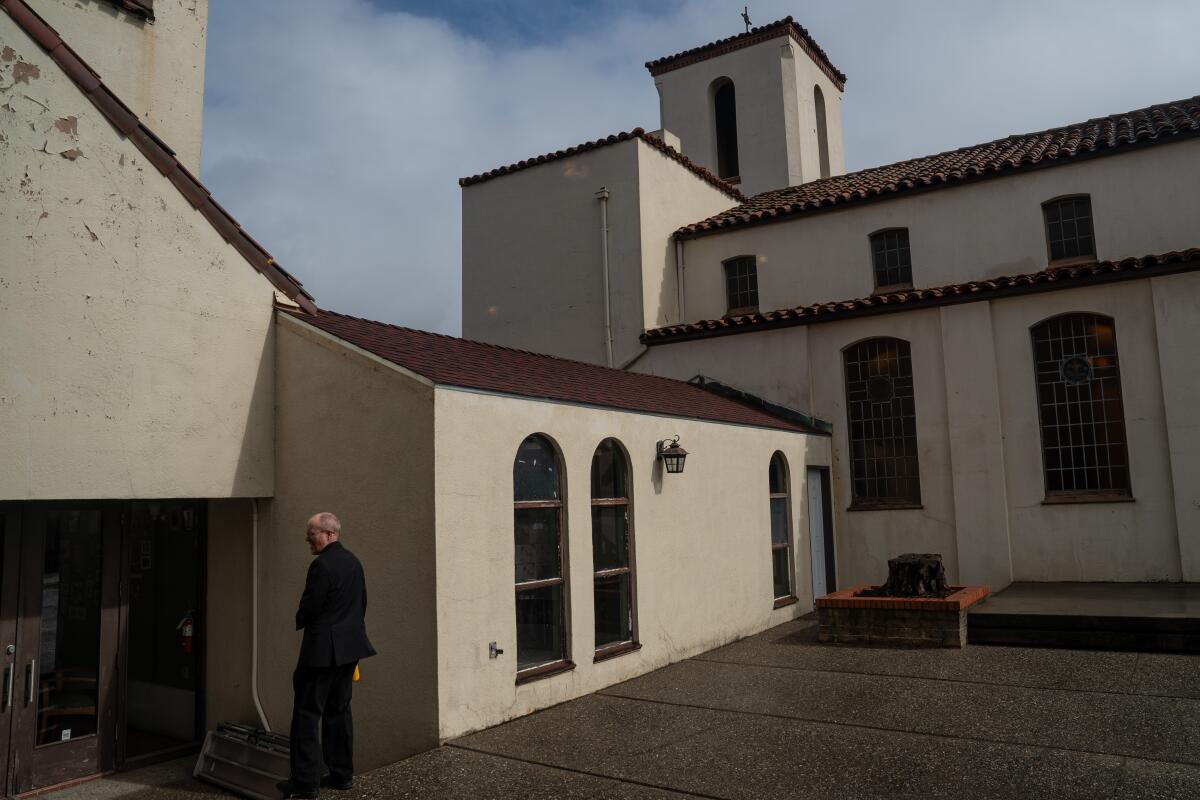
Bethlehem Lutheran is housed in an elegant white building with an imposing bell tower that stands tall near the 980 Freeway, which cuts like a gash through the city, splitting West Oakland from the high-rises downtown. Inside, the paint is peeling, the books in the community library are worn and the proclamations from the state Assembly and City Council honoring the church and its influence are decades old.
The entrance is lined with photos that tell a nearly 100-year-old history of perseverance that is deeply intertwined with the history of the surrounding community.
The church was founded by two sets of sisters who left Louisiana and made their way to Oakland in the midst of the First Great Migration of Black people from the Jim Crow South. There was already a Lutheran church in the community. But not a Black church. And the sisters wanted to make something that would belong to the growing Black community, many of whom also had fled the segregated South.
Bethlehem Lutheran was the name of their church in New Orleans — one of the first Black Lutheran churches in the country.
The wealthy island city of Coronado, after years of resistance, agrees to zone for more affordable housing under a settlement with the state.
As West Oakland grew into a bustling community with a vibrant jazz and blues music scene and a thriving corridor of Black-owned businesses along 7th Street, Bethlehem Lutheran became a “vital working part of the Black Community,” the church’s history says, “uplifting its members, giving them the strength to fight and overcome racism, remembering that with God they would prevail.”
In the mid-20th century, the community changed dramatically. Entire neighborhoods were bulldozed as West Oakland was surrounded by highways. An elevated BART train track was routed right down the middle of the 7th Street. And in the 1980s, the 980 split the community from downtown. All together, about 5,100 homes and businesses were razed to make way for urban renewal projects, said Councilwoman Carroll Fife, who represents the community.

As the neighborhood transformed, the church remained a vital influence. In the 1970s, ’80s and ’90s, it was led by the Rev. Will Herzfeld, a civil rights activist who had been active in the Southern Christian Leadership Conference and worked closely with King. He helped lead the church to become involved in the issues of the day, establishing a thriving health clinic and a homeless outreach ministry.
When some of the first Black soldiers in the country publicly ask to be discharged from the Army as conscientious objectors, they did so alongside Herzfeld at Bethlehem Lutheran.
In the early ’90s, when former Black Panther Party leaders gathered for the first time in years to demand the release of Elmer (Geronimo) Pratt, they chose Bethlehem Lutheran as their meeting spot.
There was a time when anyone who was anyone in Oakland would come to the church, said Janice Boykin, 66, a lifelong member — members of the Golden State Warriors, the owner of the Oakland Tribune, politicians, community advocates.
But the church’s influence began to wane as Black residents increasingly left.
“Back then the church was very vibrant, very full, we were a church that was thriving,” said Willie Kelly, 68, who joined in the 1980s. Then “people were going away, moving into other communities and just leaving. It was hard for us to pass the torch to the kids.”
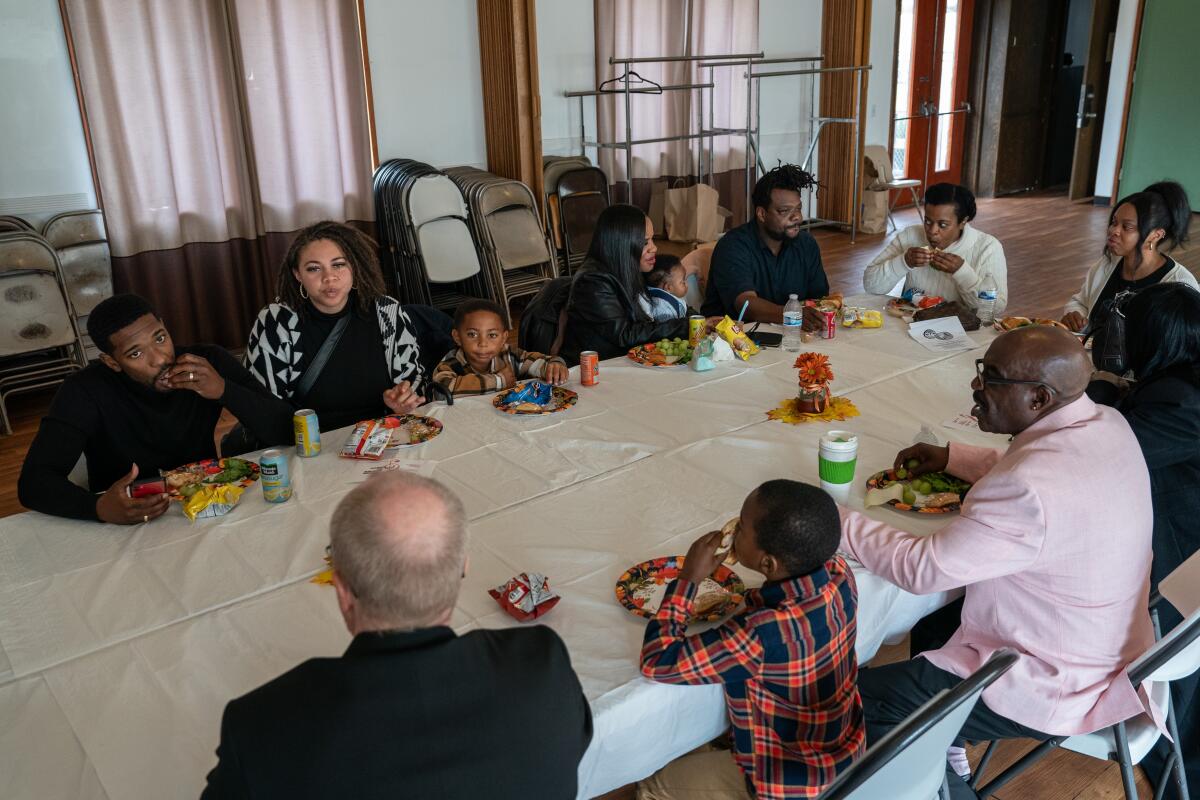
Some longtime members are so attached to the church that they have continued to attend, Sunday after Sunday, even when they live far away.
“They’re family now,” said Boykin, who lives 35 miles away in Antioch. “Why would you leave family?”
But membership dwindled and for about 10 years, until 2021, the church did not have a full-time pastor, partly because it became difficult for the congregation to pay a good salary.
Benson, 59, arrived after having left a career in the corporate world. Though he’d like to move to Oakland, he can’t afford it. But as he began to get to know West Oakland better, he said, the impact of the housing crisis on the surrounding community became abundantly clear.
Earlier this year, the city finished clearing what had become one of the largest homeless encampments in the state, housing a community of more than 200 people on lots that spanned several blocks.
Today, even in its absence, nearby parks are surrounded by tightly packed tents and RVs. Logs that were placed in the road in an apparent vigilante effort to stop more RVs from parking have been pushed into the middle of the road. Nearby, there are dozens of tiny cabins set up by the city as a temporary solution that cost $8.3 million.
As L.A. officials and residents push to get rid of RV encampments, one woman’s story reflects the mountainous obstacles faced by those who try to find housing.
In the winter, Benson got a call telling him that a young woman who had been sleeping in front of the church had died on its steps. Why she was there is still unclear. But for Benson and others at the church it underscored the crisis they had been seeing grow around them.
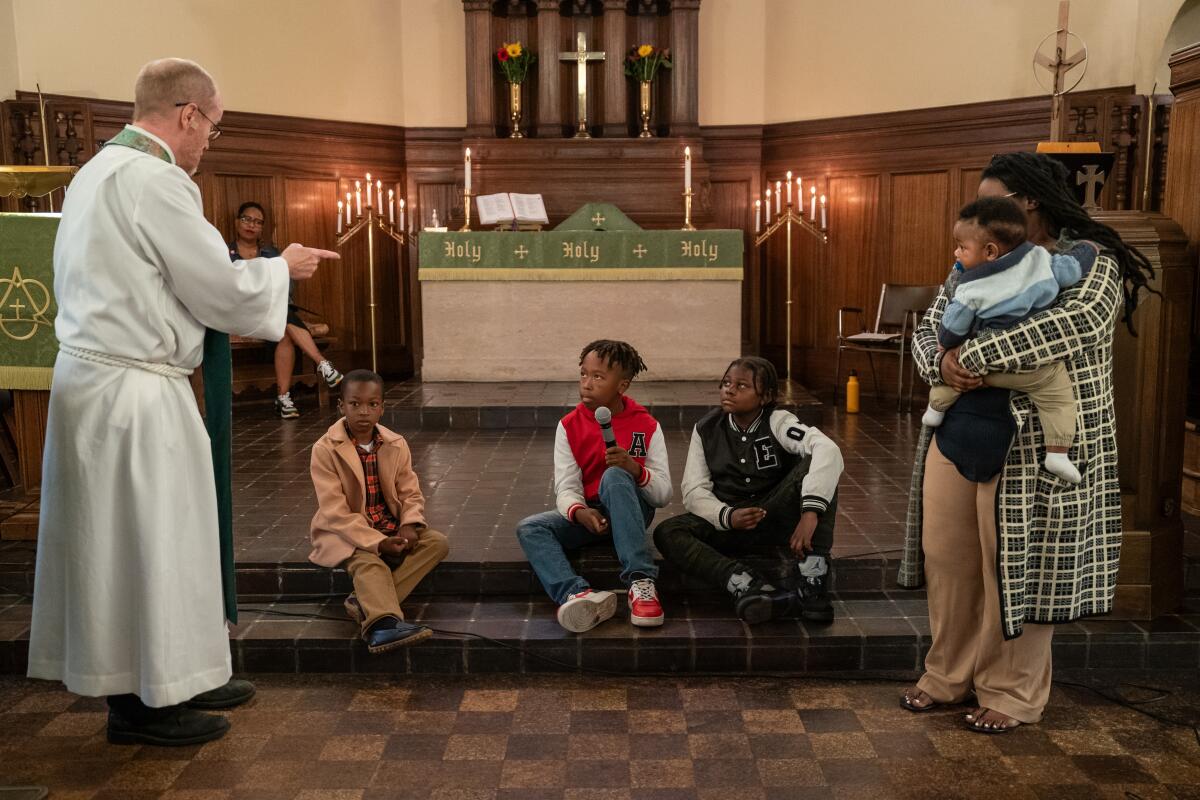
“This is an emergency,” says Benson. “We walk by and see tent cities and people living on the streets and we accept it as a given. It should not be a given. We are all one community.”
On a Monday afternoon in October, Les Morones and a crew of three other door knockers hired by the church walked up and down Center Street, talking to anyone who answered.
Their first stop was a faded Victorian where a young woman opened the door and politely agreed to answer their questions.
“Do you feel you pay more than a third of your income in rent?” Morones asked.
“Yes,” the woman said.
“Have you faced a rent increase in the last two years?”
“Yeah.”
“Do you feel you have to sacrifice from buying quality food and paying for medical or health insurance because of the cost of rent?”
“Sometimes, yeah.”
“Do you dream of buying a house one day?”
“Yes,” she said. “It probably won’t be in the Bay Area.”
The answers are pretty common, Morones said. So far, they have talked to about 250 residents and they plan to talk with more in the coming months. After that Benson hopes to start inviting survey respondents to meetings at the church to discuss ways to mobilize together to address the concerns that have become apparent from the surveys. There won’t be a set plan until residents start coming together to talk about what they want to do. The question, Benson said, is “how do we build power as a community?”
“Sometimes you can get dispirited and feel there’s nothing we can do,” he said. “But when we come together we can build power, in a good sense, for the neighborhood.”
The church has also resumed a longtime practice of preparing and serving meals to the homeless on weekends and is distributing clothing and diapers to families in need.
For members of the congregation, the hope is also that the meetings, the outreach and the food and clothing distribution will serve to bring people back inside the church walls. There’s been talk of hosting events or renting out the hall at a low cost for locals to use for family celebrations.
Kelly, who has been part of the church for about 40 years, said he worries about the day that the ever-shrinking membership will no longer be able to financially sustain the building that has been its home for decades.
Sometimes, he said, he imagines that if that happens a developer will swoop in, tear the building down and build a high-rise. And yet another Black mainstay will be gone in West Oakland.
“The fact is this is a Black Lutheran congregation, and once that closes down, then it’s just another Black thing that leaves the area,” Kelly said. “Just like the housing and everything else.”
More to Read
Sign up for Essential California
The most important California stories and recommendations in your inbox every morning.
You may occasionally receive promotional content from the Los Angeles Times.
